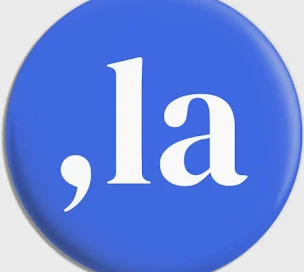The Punctuation Mark That Could Save Democracy
And the apostrophe anarchy that a Harris-Walz administration portends.
Last night I saw more punctuation-themed political T-shirts than I ever have. It gave me hope for America.
At the Liacouras Center in North Philadelphia, scores of attendees proudly wore variations on ,-la (comma-la) on their chests, celebrating the vice president/presidential nominee whose Senate office softball team was known as the Oxford Kamalas. Beyond being a great pun, the slogan gives willful know-nothings like Donald Trump, whose deliberate mispronunciation of her name is just the latest in his long line of racist outbursts, no excuse for “not knowing” how to say it. At last night’s rally, the shirt-wearers looked at each other with a “this is our tribe” vibe that’s never been stronger.
All that comma-raderie was joyful enough to mask the apostrophe anarchy lurking beneath.
While the selection of Tim Walz as a running mate will do wonders for dad jokes and Midwestern plainspeak, Kamala Harris has made the whole country realize at once that they don’t know the rules for possessives as well as they thought they did.
Who is Walz? Harris’ running mate, or Harris’s running mate? For that matter, who is Harris? Walz’ running mate, or Walz’s? Is either of them even allowed to possess anything, or do the GOP’s unyielding cries of “Socialist!” mean that everything Harris and Walz have is communally owned?
If you think you know the answer, you’re probably wrong.
When a word — especially a name — ends in an S, the apostrophe rules are hard, and maddeningly inconsistent.
Take, for example, the Associated Press Stylebook, a guide used by newsrooms across the country. Most newspapers base their own style guide on the AP’s, with slight variations. The AP’s entry on possessives spans roughly two pages (depending on which edition you’re reading). According to the AP, if a word ends in S — whether as a name (like Harris) or a plural noun (like candidates) — it gets an apostrophe and no additional S. So: Harris’ running mate, the candidates’ speeches. But if it’s a singular common noun that ends in an S — witness, hostess — it would be made possessive as witness’s or hostess’s. Even this is a change from the AP’s earlier editions, which dictated that whether an S followed the apostrophe would be determined by whatever word follows it: So you would have written the witness’s testimony, but the witness’ story. Ugh.
Or look at Henry Fowler’s 1926 Dictionary of Modern Usage, which proclaims, “no book had more influence on twentieth-century attitudes to the English language in Britain.” That volume’s “possessive puzzles” take up almost a full page, and include: “It was formerly customary, when a word ended in -s, to write its possessive with an apostrophe but no additional s, e.g. Mars’ hill, Venus’ Bath, Achilles’ thews. In verse & in poetic or reverential contexts, this custom is retained … But elsewhere we now add the s & the syllable, Charles’s Wain, St James’s not St James’ … ”
Maybe “poetic or reverential contexts” are universally understood in Great Britain?
In other words, the “rules” aren’t rules at all. They vary depending on which expert you ask, and they change over time. You can always find some reputable source to justify your decision, whether you’re writing -s’ or -s’s.
So what’s a Dem to do?
Be consistent. As long as you’re consistent, you can’t be wrong.
My preference: For words that end in S — singular or plural, common or proper nouns — it’s always cleanest to add an apostrophe with no extra S: Harris’. We don’t need a million exceptions. For words that end in Z (or X, for that matter), add the S after the apostrophe: Walz’s. Z isn’t special, and Tim Walz would probably be the first one to tell you so.
But try fitting that on a T-shirt.
Grammer Grammar Calender Calendar
For anyone in or near Philadelphia, lots of grammatical happenings coming up.
Tomorrow night, Thursday, August 8, the Wingdings — the house band from The Angry Grammarian: The Musical — are hosting Live Band Karaoke at Ray’s “Happy Birthday” Bar in South Philly. (No possessive questions on Ray’s.) You pick the song, they play it, you sing it. 8 pm, free. 1200 E Passyunk Ave, Philadelphia, PA 19147.
And tickets are already selling briskly for the remounted production of The Angry Grammarian, September 20-29 at the Arden Theatre in Philadelphia. The March run of the show completely sold out before it even opened, so don’t sleep on it. Details here.






